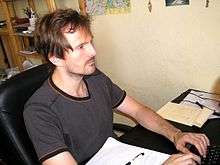Vasik Rajlich
Vasik Rajlich (born 1971 in Cleveland, Ohio) is an International Master in chess and the author of Rybka,[1] previously one of the strongest chess playing programs in the world.[2] Rajlich is a dual Czechoslovakian-American citizen by birth; he was born in the United States of America to Czech parents, at that time graduate students, but grew up in Prague. He later spent years in the United States as a student, graduating from MIT.[3]

He married Iweta (née Radziewicz) on 19 August 2006. Iweta, who is also an International Master in chess,[1] helps him with the development of Rybka as its tester.[4] In April 2012, the couple was living in Budapest, Hungary and had one child, a son.[4][5]
In April 2012, Rajlich participated in an April Fools' Day prank on ChessBase[6]—claiming by using Rybka he had proven to a "99.99999999% certainty" that the accepted King's Gambit is a draw for White, but only after 3. Be2.[5] Rajlich later admitted on ChessBase, that, "we're still probably a good 25 or so orders of magnitude away from being able to solve something like the King's Gambit. If processing power doubles every 18 months for the next century, we'll have the resources to do this around the year 2120, plus or minus a few decades".[7]
Rajlich's handle on the Internet Chess Club is "vrajlich".[8]
WCCC disqualification and banning
On 28 June 2011, the International Computer Games Association (ICGA) determined that Rajlich had plagiarized two other chess software programs: Crafty and Fruit.[9] The ICGA sanction for Vasik Rajlich and Rybka was the disqualification from the World Computer Chess Championship (WCCC) of 2006, 2007, 2008, 2009 and 2010.[10] Vasik Rajlich is banned for life from competing in the WCCC or any other event organized by or sanctioned by the ICGA.[11] Rajlich had already responded to these charges with an e-mail to David Levy, president of the ICGA, in which he stated:
Rybka “does not include game-playing code written by others”, aside from standard exceptions which wouldn’t count as ‘game-playing’. [...] The vague phrase “derived from game-playing code written by others” also does not in my view apply to Rybka[12]
Notes
- Ross, Phillip E. (February 2007). "Vasik Rajlich: Game Boy". IEEE Spectrum.
- "The SSDF Rating List". Swedish Chess Computer Association. 2007-11-03. Retrieved 2008-04-22.
- "Engineer Shocks Chess World". 2007-06-21. Archived from the original on 2008-05-17. Retrieved 2007-10-15.
- "Rybka team". Rybka. Retrieved 2009-02-23.
- Frederic Friedel (April 2, 2012). "Rajlich: Busting the King's Gambit, this time for sure". ChessBase News. Retrieved 2012-04-02.
- "The ChessBase April Fools revisited".
- "The ChessBase April Fool's prank".
- "vrajlich". Internet Chess Club. Retrieved 3 March 2011.
- ICGA Investigation Documents
- Washington Times: Computer chess champ stripped of its four titles
- Tech World: World's best chess program loses titles in plagiarism row
- "Rybka disqualified and banned from World Computer Chess Championships". Retrieved 4 July 2011.
External links
| Wikimedia Commons has media related to Vasik Rajlich. |
- Vasik Rajlich player profile and games at Chessgames.com
- Rybka games at ChessGames.com
- UCI engines.de: Interview with Vasik Rajlich (December 2005)
- SCHACH MAGAZIN 64 (May 2007) (in German)
- CHESS Magazine (May 2007)